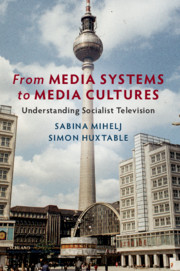28 results
Mass Media in the Post-Soviet World: Market Forces, State Actors, and Political Manipulation in the Informational Environment after Communism. Ed. Peter Rollberg and Marlene Laruelle. Soviet and Post-Soviet Politics and Society. Stuttgart: ibidem Verlag, 2018. 446 pp. Illustrations. Figures. Tables. $50.00, paper.
-
- Journal:
- Slavic Review / Volume 78 / Issue 4 / Winter 2019
- Published online by Cambridge University Press:
- 27 January 2020, pp. 1076-1077
- Print publication:
- Winter 2019
-
- Article
- Export citation
8 - Everyday Time
- from Part III - The Times of State Socialist Television
-
- Book:
- From Media Systems to Media Cultures
- Published online:
- 23 August 2018
- Print publication:
- 23 August 2018, pp 207-232
-
- Chapter
- Export citation
10 - Extraordinary Time
- from Part III - The Times of State Socialist Television
-
- Book:
- From Media Systems to Media Cultures
- Published online:
- 23 August 2018
- Print publication:
- 23 August 2018, pp 261-293
-
- Chapter
- Export citation
References
-
- Book:
- From Media Systems to Media Cultures
- Published online:
- 23 August 2018
- Print publication:
- 23 August 2018, pp 330-358
-
- Chapter
- Export citation
Part III - The Times of State Socialist Television
-
- Book:
- From Media Systems to Media Cultures
- Published online:
- 23 August 2018
- Print publication:
- 23 August 2018, pp 205-321
-
- Chapter
- Export citation
11 - Conclusions
- from Part III - The Times of State Socialist Television
-
- Book:
- From Media Systems to Media Cultures
- Published online:
- 23 August 2018
- Print publication:
- 23 August 2018, pp 294-321
-
- Chapter
- Export citation
4 - Television and Varieties of Modernity
- from Part I - Concepts and Contexts
-
- Book:
- From Media Systems to Media Cultures
- Published online:
- 23 August 2018
- Print publication:
- 23 August 2018, pp 92-114
-
- Chapter
- Export citation
Part I - Concepts and Contexts
-
- Book:
- From Media Systems to Media Cultures
- Published online:
- 23 August 2018
- Print publication:
- 23 August 2018, pp 23-114
-
- Chapter
- Export citation

From Media Systems to Media Cultures
- Understanding Socialist Television
-
- Published online:
- 23 August 2018
- Print publication:
- 23 August 2018
2 - Comparing Media Cultures
- from Part I - Concepts and Contexts
-
- Book:
- From Media Systems to Media Cultures
- Published online:
- 23 August 2018
- Print publication:
- 23 August 2018, pp 25-57
-
- Chapter
- Export citation
1 - Introduction
-
- Book:
- From Media Systems to Media Cultures
- Published online:
- 23 August 2018
- Print publication:
- 23 August 2018, pp 1-22
-
- Chapter
- Export citation
7 - Transnationalism
- from Part II - The Spaces of State Socialist Television
-
- Book:
- From Media Systems to Media Cultures
- Published online:
- 23 August 2018
- Print publication:
- 23 August 2018, pp 177-204
-
- Chapter
- Export citation
Contents
-
- Book:
- From Media Systems to Media Cultures
- Published online:
- 23 August 2018
- Print publication:
- 23 August 2018, pp v-v
-
- Chapter
- Export citation
Tables
-
- Book:
- From Media Systems to Media Cultures
- Published online:
- 23 August 2018
- Print publication:
- 23 August 2018, pp viii-viii
-
- Chapter
- Export citation
9 - History
- from Part III - The Times of State Socialist Television
-
- Book:
- From Media Systems to Media Cultures
- Published online:
- 23 August 2018
- Print publication:
- 23 August 2018, pp 233-260
-
- Chapter
- Export citation
Abbreviations of Archival Sources
-
- Book:
- From Media Systems to Media Cultures
- Published online:
- 23 August 2018
- Print publication:
- 23 August 2018, pp xii-xiv
-
- Chapter
- Export citation
Methodological Appendix
-
- Book:
- From Media Systems to Media Cultures
- Published online:
- 23 August 2018
- Print publication:
- 23 August 2018, pp 322-329
-
- Chapter
- Export citation
Figures
-
- Book:
- From Media Systems to Media Cultures
- Published online:
- 23 August 2018
- Print publication:
- 23 August 2018, pp vi-vii
-
- Chapter
- Export citation
Part II - The Spaces of State Socialist Television
-
- Book:
- From Media Systems to Media Cultures
- Published online:
- 23 August 2018
- Print publication:
- 23 August 2018, pp 115-204
-
- Chapter
- Export citation
5 - Publicness
- from Part II - The Spaces of State Socialist Television
-
- Book:
- From Media Systems to Media Cultures
- Published online:
- 23 August 2018
- Print publication:
- 23 August 2018, pp 117-145
-
- Chapter
- Export citation



